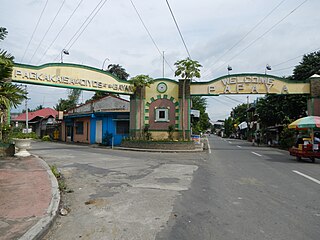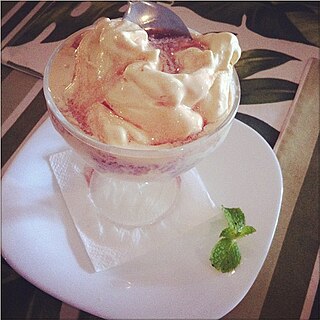
The papaya, papaw, or pawpaw is the plant Carica papaya, one of the 22 accepted species in the genus Carica of the family Caricaceae. Its origin is in the tropics of the Americas, perhaps from Central America and southern Mexico.

Green papaya salad, called tam som or tam maak hoong is a spicy salad made from shredded unripe papaya. Originating from ethnic Lao people, it is also eaten throughout Southeast Asia.

Carica is a genus of flowering plants in the family Caricaceae including C. papaya, the papaya, a widely cultivated fruit tree native to the American tropics.

The mountain papaya also known as mountain pawpaw, papayuelo, chamburo, or simply "papaya" is a species of the genus Vasconcellea, native to the Andes of northwestern South America from Colombia south to central Chile, typically growing at altitudes of 1,500–3,000 metres (4,900–9,800 ft).

General Tinio, officially the Municipality of General Tinio, is a 1st class municipality in the province of Nueva Ecija, Philippines. According to the 2020 census, it has a population of 55,925 people.

Creme de papaya is a Brazilian dessert. It was a culinary fad in Brazil in the mid-1990s. Nowadays, its popularity has diminished somewhat.

Urszula Bogumiła Dudziak-Urbaniak is a Polish jazz vocalist. She has worked with Krzysztof Komeda, Michał Urbaniak, Gil Evans, Archie Shepp, and Lester Bowie. In 2007, her 1970s song "Papaya" gained widespread popularity in Asia and Latin America.

The Caricaceae are a family of flowering plants in the order Brassicales, found primarily in tropical regions of Central and South America and Africa. They are usually short-lived evergreen pachycaul shrubs or small to medium-sized trees growing to 5–10 m tall. One species, Vasconcellea horovitziana is a liana and the three species of the genus Jarilla are herbs. Some species, such as the papaya, bear edible fruit and produce papain.
Lelwani or Leluwani was a Hittite goddess of the underworld, equated with the Hurrian Allani under her Akkadian name Allatum. She lived in the Dark Earth.

Phytophthora palmivora is an oomycete that causes bud-rot of palms, fruit-rot or kole-roga of coconut and areca nut. These are among the most serious diseases caused by fungi and moulds in South India. It occurs almost every year in Malnad, Mysore, North & South Kanara, Malabar and other areas. Similar diseases of palms are also known to occur in Sri Lanka, Mauritius, and Sumatra. The causative organism was first identified as Phytophthora palmivora by Edwin John Butler in 1917.

Papaya ringspot virus (PRSV) is a pathogenic plant virus in the genus Potyvirus and the virus family Potyviridae which primarily infects the papaya tree.

Atchara, is a pickle made from grated unripe papaya popular in the Philippines. This dish is often served as a side dish for fried or grilled foods such as pork barbecue.

881 is a 2007 Singaporean musical-comedy-drama film written and directed by Royston Tan, based on the Singapore Getai scene. It is the second Singaporean film that has been released in Japan.
Time and fate deities are personifications of time, often in the sense of human lifetime and human fate, in polytheistic religions. In monotheism, Time can still be personified, like Father Time.
USS Papaya (AN-49/YN-68) was an Ailanthus-class net laying ship which served with the U.S. Navy in the South Pacific Ocean theatre of operations during World War II. Her career was without major incident, and she returned home after the war bearing two battle stars to her credit.

Papaya, Love Goddess of the Cannibals is a 1978 Italian cannibal film directed by Joe D'Amato. It was written by Roberto Gandus and stars Melissa Chimenti in the titular role, opposite Sirpa Lane.

Kundang or Pengkalan Kundang refers to an area in Selangor, Malaysia. It is located approximately 17 km from Rawang, Selangor and 33 km north-west of Kuala Lumpur. Kundang is used to be agricultural village. But now, it is one of the modern villages in the state with its own highway, LATAR. It comes under the Gombak District, one of the biggest districts in the state of Selangor. Bandar Tasik Puteri, Pekan Kundang, Bandar Rawang is the nearest town from the village. Farming and related activities constitute the core economic drivers of this pastoral village. It comes under Selayang Parliament constituency, and falls into the jurisdiction of Majlis Perbandaran Selayang (MPS).

The Scent of Green Papaya is a 1993 Vietnamese-language film produced in France by Lazennec Production, directed by Vietnamese-French director Tran Anh Hung, and starring Tran Nu Yên-Khê, Man San Lu, and Thi Loc Truong.

Ginataang manok is a Filipino chicken soup made from chicken in coconut milk with green papaya and other vegetables, garlic, ginger, onion, patis or bagoong alamang, and salt and pepper. It is a type of ginataan. A common variant of the dish adds curry powder or non-native Indian spices and is known as Filipino chicken curry.

Dangke is a type of cheese produced in South Sulawesi, Indonesia, especially in Enrekang, Baraka, Anggeraja, and Alla districts. Dangke is processed by boiling fresh buffalo milk with sliced papaya leaves, stems, or unripe papaya fruits. Dangke is typically soaked in a brine solution overnight before being wrapped with banana leaves for masking the bitter taste caused by the addition of papaya leaves.















